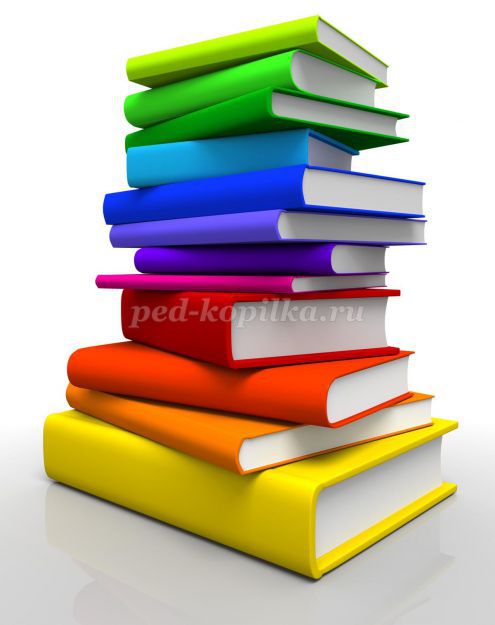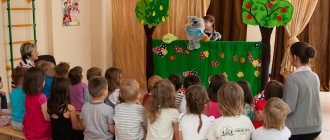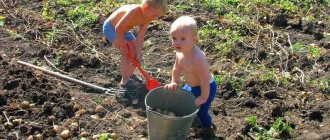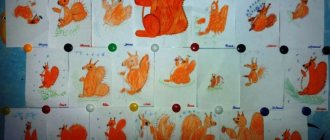Abstract on the organization of household work “Book Workshop” in the senior group
Notes on the organization of household work “Book Workshop” in the senior group.
Compiled and conducted by the teacher: Levchenko Tatyana Vitalievna. The material is provided and will be useful for kindergarten teachers. Goal: consolidate and improve skills previously acquired in work. Integrated tasks: Educational: continue to teach children how to repair books, teach how to properly handle a book; Developmental: development of fine motor skills of the hands, eye, development of labor skills, consolidation of the ability to bend a strip in half, cutting paper along the fold of a strip with scissors; Educational: to cultivate in children a sense of kindness, a desire to participate in joint work activities, independence and accuracy, to bring the work started to the end, to cultivate a desire to work for the benefit of others, to cultivate a caring attitude toward books; -nurture friendly relationships between children, find common interests; develop responsiveness and help younger people. Preliminary work: We learned in classes the simplest skills and abilities: cutting paper of a given size, careful work with glue and scissors. As a result of assignments, we mastered the skills of maintaining order in the book corner, cultivated socially oriented motives for collective work, and during ethical conversations emphasized the importance of social work , the need to work not only for yourself, but for everyone. We read S.Ya. Marshak’s poems “How our book was printed”, “A book about books”. Children were introduced to the rules of working with a book, with proverbs and sayings about the book. Equipment: books that need to be “treated”; scissors - 12 pieces; glue - 12 pieces; lining sheets - 12 pcs., paper napkins - 12 pcs.; 12 strips of white paper, a suitcase for books, a sign “Book Workshop”, a recording of the phonogram of a physical education session.
Progress of labor activity: 1. Organizational moment. Educator: It was simply invented by someone and wisely - When you meet, say hello - good morning! Hello, our guests! Guests: Hello, children! Educator: Guys, I want to tell you a riddle, and you listen to it and try to guess: A blizzard is walking outside the window, drawing a pattern on the window, And my beloved friend and I are warm, talking all evening. He showed me pictures, a children's camp, a forest, a fire. I took an ink eraser and erased all the stains from my friend. Then I bookmarked the sheets with a blue bookmark until tomorrow. He took his friend carefully with his hand and put him on the shelf in the closet. Children: Book! They knock on the door (a surprise moment.) (The teacher of the junior group, Inna Aleksandrovna, enters, holding a suitcase in her hands.) Inna Aleksandrovna: Hello, guys. You recognized me? (Yes) That’s right, I’m a teacher of the younger group and my name is Inna Aleksandrovna. Look what I brought - these are books. (takes it out of the suitcase) The kids in the younger group are very upset, their books are torn, but they are small children and cannot “fix” these books. And then I thought to go to you, maybe the guys from the older group could help us? Educator: Guys, what do you think: why did these books get sick? Children: (they were not taken care of, they were treated incorrectly). Educator: A lot of people are working on creating one book. A book goes a long way before it falls into our hands. Therefore, taking care of books means respecting the work of these people. Inna Aleksandrovna: How should you handle a book so that it is always in order? Children's answers: 1. Don't draw, don't write anything in books. 2.Do not tear out sheets or cut out pictures; 3.Do not bend books so that the pages do not fall out; 4.Look at the book with clean hands; 5.Do not read a book while eating; 6.Look at a book at a clean table; 7.Do not put pencils and pens in books so as not to tear their spines; 8.Use a bookmark. Educator: Children, why do we need books? (to read, look at pictures, learn something new, interesting, useful, learn letters....) Educator: Correct. A book is our best friend, we draw knowledge from it. Let's remember what proverbs and sayings we know about the book (whoever names a proverb rings the bell) 1. “A book is a small window, through it the whole world can be seen” 2. “A book is the best gift” 3. “One book teaches a thousand people " 4. “Who reads a lot, knows a lot" 5. “From time immemorial, a book raises a person” 6. “A book is a book, but move your mind” 7. “If you follow a book, you will gain intelligence” 8. “Live your whole life, your whole life read throughout your life, learn throughout your life” 9. “Gold is mined from the earth, and knowledge comes from a book” 10. “A book is the key to knowledge” Inna Aleksandrovna: Guys, what a great fellow you are. You know so many proverbs and sayings about books. Will you help me “cure” these books? Children: Yes! Educator: What do we need to repair them? Scissors, glue, paper. Then I will ask you to prepare your workplace. Ready. Educator: We have work to do to repair books, we need to gain strength. Let's all get up from our seats and do some physical education. Physical education lesson (performed to music) Educator: Now we can open our book workshop. (I hang a sign - an emblem on the board). BOOK WORKSHOP

And for your efforts, I will give you new books, which in your hands will be clean, neat and healthy.
From these books you will learn a lot of new and interesting things. (gives books to children)
Goodbye, children!
Children: Thank you very much! Educator: Our book workshop is closing. Thank you to all the children for your help in repairing books for kids! Thank you very much to the teachers for your attention.
We recommend watching:
Excursion to the library with preschoolers Synopsis of a comprehensive educational activity on the development of fine motor skills and coordination of finger movements in the senior group Synopsis of a lesson on the surrounding world in the senior group with a presentation Synopsis of direct educational activities on the development of speech and the surrounding world (senior
Similar articles:
Nurturing cognitive interests in children of senior preschool age
Identification of cognitive interests in preschool children
Formation of cognitive interest in mathematics among older preschoolers
Cultivating cognitive interest in nature in children of senior preschool age
Cultivating cognitive interest in book graphics in children of senior preschool age


